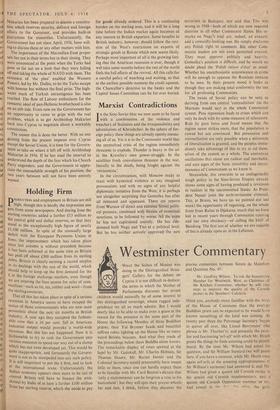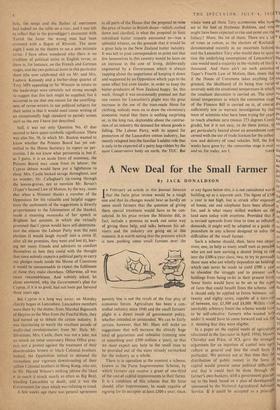Westminster Commentary
WHAT the Sultan of Muscat was doing in the Distinguished Stran- gers' Gallery for the debate on Cyprus it is not difficult to deduce; the terms in which the Mother of Parliaments- discusses her errant children would naturally be of some interest to this distinguished sovereign, whose rugged inde- pendence we all so much admire. But I would dearly like to be able to make even a guess at the reason for the presence in the same part of the House the following Monday of three Buddhist priests, their Yul Brynner heads and beautiful saffron robes lighting up the House like so many weird Belisha beacons. And what they made of the proceedings below them Buddha alone knows. The remarkable display of roses sported at the lapel by Mr. Gaitskell, Mr. Charles Hobson, Sir Thomas Moore, Mr. Barnet Janner and the Colonial Secretary would presumably have meant little to them, since one can hardly expect them to be familiar with Mr. Cecil Beaton's dictum that 'only a stationmaster can be forgiven a rose in his buttonhole'; but they will spin their prayer-wheels far and fast, I think, before they discover the precise connection between Simon de Montfort and Question No. 45: Mr. Geoffrey Wilson: To. ask the honourable Member for Woolwich, West, as Chairman of the Kitchen Committee, whether he will lake steps to improve the quality of the Cornish . pasties in the Members' Cafeteria.
Mind you, anybody more familiar with the ways of the House of Coinmons than the avenge Buddhist priest can be expected to be would hive known something of the kind was coming. At twenty past thrpe the Patronage Secretary `began to quiver all over, like Lionel Barrymore' (the phrase is Mr. Thurber's); and presently the pecu- liar and fascinating `arf-air with which Mr. Heath greets the things he finds amusing could be plainly heard. By the time Mr. Wilson had asked his question, and Sir William Steward (we will pause here, if you have a moment, while Mr. Heath once again arf-arfs at the amazing appropriateness ct Sir William's surname) had answered it, and Mr Wilson had given a quaint old Cornish recipe in his quaint old Cornish supplementary, and a quaint old Cornish Opposition member or INN, had joined in th,- ■,-11-pc the gam- bols, the songs and the flashes of merriment had indeed set the table on a roar, and I was left to reflect that in the gravedigger's encounter with Yorick the Jester the wrong man had been crowned with a flagon of Rhenish. The same night I went to the theatre to see a new intimate revue. I have often wondered why there is no tradition of political satire in English revue, as there is, for instance, on the French and German stages, and the two political items in this particular show (the now celebrated skit on Mr. and Mrs. Ludovic Kennedy and a barber-shop quartet of Tory MPs appealing to Sir Winston to return to the leadership) were certainly not strong enough to suggest that this lack might be supplied; but it occurred to me that one reason for the unwilling- ness of revue-writers to use political subjects for their satire is that it would need comic writing of an exceptionally high standard to parody scenes such as the one I have just described.
Still, it was not only Question No. 45 that seemed to have quasi-symbolic significance. There was also No. 58, in which Mr. Rankin wanted to know whether the Poisons Board has yet sub- mitted to the Home Secretary its report on per- somnia. I do not know what persomnia is, but if, as I guess, it is an acute form of insomnia, the Poisons Board may cease from its labour; the Cyprus debate would have put a lighthouse to sleep. Mrs. Castle looked savage throughout, and no wonder; Mr. Callaghan's tip-toeing through the lemon-groves, not to mention Mr. Bevan's (Taper's Second Law of Motion, by the way, states that when a Minister thanks a member of the Opposition for his valuable and helpful sugges- tions the uselessness of the suggestions is directly proportionate to the fulsomeness of the thanks), made a steaming moussaka of her speech at Brighton last autumn, in which she virtually promised that Cyprus would have self-determina- tion the minute the Labour Party won the next election (I would laugh myself into a Coma if, after all the promises, they went and lost it), leav- ing her many friends and admirers to comfort themselves as best they could with the thought that since nobody expects a political party to carry out pledges made inside the House of Commons it would be unreasonable to expect the fulfilment of those they make elsewhere. Otherwise, all was sweet reasonableness. And nobody asked, let alone answered, why the Government's plan for Cyprus, if it is so good, had not been put forward three years ago.
But Cyprus is a long way away; on Monday charity began in Lancashire. Lancashire members' were there by the dozen; from Marshal Bigmouth of Huyton to the Man from the Fearful Hole, they had turned up to debate the cotton industry. It was fascinating to watch the resultant parade of • mufti-clad revolutionaries; from Mr. Hale, Mr.
Silverman, Mrs. Castle, there was not a joke, not an attack on some unsavoury Home Office prac- tice, not a protest against the treatment of their downtrodden brown or black Colonial ,brothers. Indeed, the Opposition united to demand the immediate and vigorous downtreading of their yellow Colonial brothers in Hong Kong, who are, in Mr. Harold Wilson's striking phrase (he liked it so much it struck nearly as often as Big Ben), bleeding Lancashire to death; and it was the Government for once which was refusing to tread.
A few weeks ago there was general agreement in all parts of the House that the proposal to raise the price of butter in British shops—which, melted down and clarified, is what the proposal to limit subsidised butter imports amounted to—was a splendid wheeze, on the grounds that it would be a great help to the New Zealand butter industry. It was left to your correspondent to point out that few housewives in this country would be keen on an increase in the cost of living, deliberately engineered by a Government which is always yapping about the importance of keeping it down and supported by an Opposition which yaps to the same effect but even louder, in order to keep the butter-producers of New Zealand happy. So, this week, though it was occasionally pointed out that one reason for Lancashire's plight was the great increase in the use of the man-made fibres for clothing, nobody went on to draw the elementary economic moral that there is nothing surprising or, in the long run, deplorable about the contrac- tion of an industry the demand for whose goods is falling. The Labour Party, with its appeal for protection of the Lancashire cotton industry, has merely relapsed into the familiar Luddite role that is only to be expected of a party hag-ridden by the most Conservative body on earth, the TUC. But where were all these Tory economists who have sat at the feet of Professor Robbins, and who might have been expected to rise and point out the fallacy? Mum, the lot of them. There are a lot of votes in cotton, as the electors of Rochdale demonstrated recently in no uncertain fashion, and the Lancashire Tory who would dare to ques. tiori the underlying assumptions of Lancashire's case would need a majority in the vicinity of thirty thousand. And there ain't no such animiles, Taper's Fourth Law of Motion, then, states that if the House of Commons takes anything for granted, the likelihood of its being true varies inversely with the emotional temperature in which the resultant discussion is carried on. The emo- tional temperature in which the committee stage of the Finance Bill is carried on is, of course, sufficiently low to warrant investigation by that team of scientists who have been trying for years to reach absolute zero (minus 273 degrees Centi- grade), but it is not easy, to do them justice, to get particularly heated about an amendment con. cerned with the use of trade licences for the collec- tion and delivery of road vehicles. Still, the five weeks have gone by; the committee stage is over;























































 Previous page
Previous page